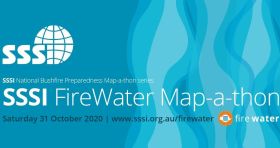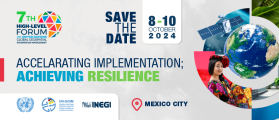
Eugene Lamnek created GeoIT Solutions in 2002, and has been developing ArcGIS customizations, add-ins and applications ever since. In this time Eugene has developed numerous bushfire applications for the CFS and the CFA as well as water and wastewater modelling software, asset management applications and interfaces, and open source applications for numerous clients including SA Water, Santos and DEW.
The Treatment Reporting System (TRS) currently in pilot phase, will allow organisations to store and manage their bushfire mitigation tasks, as well as measuring these tasks against the requirements of the Bushfire Management Area Plans (BMAPs). The system will allow users to store bushfire mitigation tasks, their spatial extent, values of work, time of work and completion status. Tasks are mapped and measured against required actions, defined by within the CFS BMAPs. The TRS will provide an effective mechanism for reporting the adequacy of on ground mitigation work (potentially at a State-wide level) by measuring mitigation work against well-defined mitigation targets. Users of the system will include local government, state government, private organisations and potentially even individual landholders.
Venue
Zoom Webinars
Cost
SSSI Members $30 | Non-Members $45 | SSSI YPs $20 | SSSI Student Members FREE
Contact
SSSI South Australia | rom.sa@sssi.org.au | 08 8212 0359

SSSI in conjunction with the Hunter Environmental Institute will present this webinar with three pre-eminent speakers:
Amy Steiger (Cardno)
Title: RPAS and thermal cameras for wildlife detection post-bushfire and coastal monitoring
Details: Amy has promoted the use of Remotely Piloted Aircraft Systems (RPAS) gaining experience with remote data capture to cover a range of coastal, environmental and land development applications.
RPAS thermal inspection capability was deployed this summer in wildlife detection post-bushfires.
Amy has also done volumetric surveys of beaches and flown isolated coastal cliff faces in NSW to capture high-resolution photography and derived photogrammetric models to identify geotechnical hazards and contribute to coastal monitoring.
Charity Mundava (WaterNSW)
Title: Remote Sensing in Water Management
Details: Charity will discuss the use of GIS and remote sensing to support water catchment management, feasibility and environmental studies for critical water infrastructure across the state and to support ongoing research into and management of river catchments. Charity will touch on the significance and spatial support for this in the recent NSW bushfires coordinating reservoir availability (in drought) and access for helicopter water drops and supporting bushfire fighting efforts.
Associate Professor In-Young Yeo (University of Newcastle)
Title: Remote sensing and GIS applications for water resources management
Details: Dr Yeo will explain how remote sensing can be used as a technique for assessing soil moisture using multi-source data fusion approaches, vegetation monitoring and water requirement with remote sensing and water balance approach.
She will explain the impacts of conservation management practices in agricultural catchments assessed using catchment model and remote sensing/GIS drawing on examples from Australian and American case studies
CPD Points
BOSSI CPD is 1 SP for this webinar.
Cost
As per details as follows
Contact
rom.nsw@sssi.org.au

MaaS offers the potential to drastically improve customer choices, reduce travel costs, increase network capacity and transport sustainability while improving social and environmental outcomes.
From a concept that excited the industry to consider how we might rethink transport to a real world offering that is providing a new way to plan, book and pay for transport.
Mobility 2020 will be a VIRTUAL CONFERENCE.
Australia’s leaders in ITS Mobility and MaaS will bring together experts from industry, government and academia to learn and share ideas about the impact of COVID-19 on our industry and communities. Transportation, freight and logistics, and the transport and technology sector widely have been both massively impacted and deliver essential services. How are organisations and individuals adapting and learning through this crisis?
We will also look at behavioural change, how people are likely to work and study post the covid pandemic, what will be the impact on fare revenue and fare sharing, what are the new sets of challenges MaaS is trying to solve. Join online as key organisations will share covid success stories and how they are pivoting from the pandemic experience.
Now more than ever it is important to stay connected with industry, government and academia to maintain vital connections during a time where our industry is both working at the front lines and continuing to deliver on their existing important roles. Sharing information about what industry is doing and how we are preparing for the future has never been more important.
Key Dates
Wednesday 2 – Thursday 3 September 2020: Virtual sessions, keynote speaker interviews, presentations and panel discussions, live interactive Q&A sessions, polls and surveys.
Program
Full program and speaker line-up to be announced.
Sessions will be broken down and spread over 2 days – allowing you time to connect interact with attendees and presenters via the event platform.
Speakers
We are working with a group of industry experts to design a program that is both substantive and exciting, if you are interested to be a speaker or contribute to an interactive panel discussion, you are encouraged to email your expression of interest to ITS Australia and include:
- Proposed Speaker: Name, Job Title, Organisation
- Proposed presentation title
- Brief paragraph of presentation focus (max 200 words)
Email to: admin@its-australia.com.au

Check out our upcoming Webinar which talks more about the Growing Data Foundation’s FireWater App and the SSSI FireWater Map-a-thon. Details are as follows:
Date: Wed, 7th October, 2020
Time: 12PM AEDT
RSVP: Further details click here
And don’t forget to register for the SSSI FireWater Map-a-thon here

At 1Spatial we use validation, integration, automation and our rules-based approach to build strong data infrastructures, leading to better outcomes and making your data smarter.
Have you thought about how you will transform your data to GDA2020?
During this session, we will help you understand the requirements needed for GDA2020 and the best way to migrate your data to this new datum!
Join our team for a free webinar on Friday 27th November and hear how we can help you migrate your data to GDA2020.
Agenda
- Recognising your data and understanding the effect this will have on your data
- Authoritative data sets that already exist
- GA & ICSM slides defining the height datum + case studies of support issues
- Transformations with FME
- Ensuring your organisation has a plan for the transformation
- How we can help you implement the move
In the meantime, if you have any technical questions, or you’d just like a quotation on one of our products, some training or a dedicated consultancy session from one of our specialised consultants, just send us some details to sales.australia@1spatial.com and we’ll be sure to get back to you.
Did you know Australia is located on one of the Earth’s most rapidly moving tectonic plates? Resulting in Australia moving seven centimetres north-east per year!
Australian Government departments and private sector organisations are now contemplating their game plan for the migration of GDA94 to GDA2020. This data implementation is important for organisations that want to take advantage of having sub-decimetre coordinate accuracy when capturing high accuracy data.

Here at 1Spatial, we continue to work with customers across a range of diverse sectors delivering exciting and challenging projects that deliver new tools and platforms for managing their data. We have worked on projects with different customers to manage and track the transition to GDA2020- enabling users to migrate their data to the new datum.
During the session, we will hear from the latest case studies to help you understand the requirements needed to replace GDA94 with the new GDA2020.
Agenda:
- Opening intro – Andrej Mocicka
- Case Study – Whittlesea Council
- Case Study – Bayside Council
- Open Q & A with guest presenter Richard Stanaway from Quick Close
Join our webinar to learn how these organisations migrate their data to this new datum!
In the meantime, if you have any technical questions you would like answered during our session, send us an email sales.australia@1spatial.com and we’ll be sure to cover it.

The 15th International Conference on Spatial Information Theory, COSIT 2022, will be held in Kobe, Japan, 5 to 9 September, 2022. Established in 1993, the Conference on Spatial Information Theory (COSIT) is a biennial international conference series concerned with theoretical aspects of space and spatial information, aimed at advancing geographic information science and its emerging research frontiers.
The conference offers three (refereed) submission tracks with double-blind reviews: vision papers, full papers, and short papers. Embedded in the conference will also be an on-site mentoring program for doctoral students.
Contributions can cover a broad set of conference-relevant themes such as (but not limited to):
- activity-based models of spatial knowledge
- cognitive aspects of geographic information
- cognitive-behavioural geography, naive geography
- data-driven spatial information theory
- geo-ethics and geo-privacy
- events and processes in geographic space and time
- geographic information visualisation and geovisual analytics
- knowledge representation for space and time
- navigation and wayfinding of sentient beings and robots
- ontology of space and time
- place
- quality and interoperability of geographic information
- social and cultural organisation of space
- spatial and temporal language
- spatial aspects of social networks
- spatial decision support, impact of model design
- spatial (digital) humanities
- theory-driven spatial machine learning, artificial intelligence of space
- theories on volunteered geographic information
- theory and practice of spatial and temporal reasoning
- user interfaces, virtual spaces and collaborative spaces

The US National States Geographic Information Council (NSGIC) Annual Conference is the place to enhance geospatial excellence and collaboration for state, local, tribal and federal GIS policymakers and coordinators, private sector partners and other leaders in the geospatial ecosystem.
Providing critical and timely networking opportunities, the conference also offers the chance to connect, collaborate, and share with colleagues and partners.
The agenda will comprise:
Roll Call of States — Where state representatives will share a snapshot of achievements, challenges and upcoming activities.
Plenary Sessions — Presentations by and for the NSGIC community exploring challenges, successes and new approaches for collaboration in the geospatial ecosystem.
State Caucus — A roundtable discussion with state and local government representatives to talk frankly about current pressing issues.
GIO Academy — Leadership sessions and networking for state government GIOs and equivalents only (separate registration is required).
Speed Networking — A fun and fast-paced activity where sponsors, who have allocated points, will rotate to complete the circuit of visiting with state reps.
Annual Business Meeting — Including the election of new board members and leadership transition.
Awards Reception — Recognising exceptional work through the Geospatial Excellence Awards & NSGIC Service Awards.

The United Nations Committee of Experts on Global Geospatial Information Management (UN-GGIM), in collaboration with the Government of México through Instituto Nacional de Estadística y Geografía (INEGI) will convene the Seventh High-level Forum on United Nations Global Geospatial Information Management with the theme ‘Accelerating Implementation: Achieving Resilience’.
This seventh edition of UN-GGIM’s High-level Forums will continue UN-GGIM’s regular high-level, multi-stakeholder discussions on global geospatial information management, through the convening of global forums, aimed at promoting comprehensive dialogue among member states, and between member states and relevant international organisations, UN system entities and stakeholders.

The complexities of understanding and forecasting evolutionary processes necessitate geographic modelling and simulation, which have emerged as potent tools for addressing critical issues such as climate change and sustainable resource use. But there is a pressing need for an open geographical modelling and simulation framework. Such a framework would serve as a catalyst, attracting more scholars and encouraging their collective efforts to address geographic challenges.
This workshop is designed to explore pertinent theories, approaches and potential applications, while fostering communication among experts from diverse domains. Its primary objectives include stimulating extensive discussions regarding the potential directions of the field and promoting further research, thus paving the way for a promising future in collaborative geographic modelling and simulation.
Organisers:
- School of Geography Science, Nanjing Normal University, China
- Key Laboratory of Virtual Geographic Environment (Ministry of Education of PRC), Nanjing Normal University, China
- International Geographical Union – Modeling Geographical Systems Commission
Co-organisers:
- International Environmental Modelling and Software Society
- The International Association of Chinese Professionals in Geographic Information Sciences
- Geographic Model and Geographic Information Analysis Commission, The Geographical Society of China
- Working Group on Education and Capability Building for Digital Earth, International Society for Digital Earth
- Jiangsu Center for Collaborative Innovation in Geographical Information Resource Development and Application, China
- National Earth System Science Data Center – Yangtze River Delta Subcenter
- School of Environment, Nanjing Normal University
Important dates:
- Abstracts due: 20 August 2024
- Early-bird registration ends: 31 August 2024



